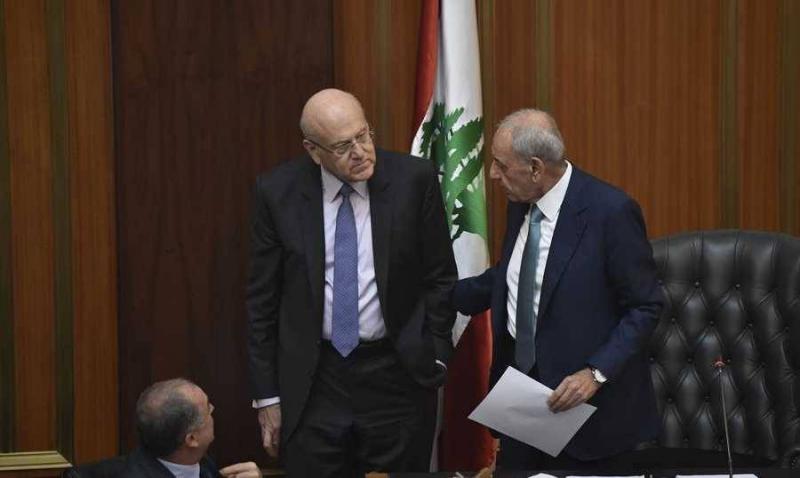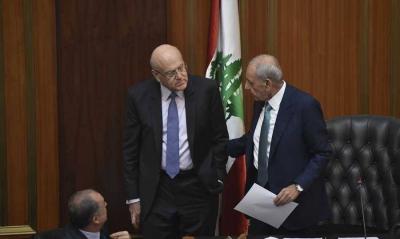The holiday break in Lebanon has delayed Speaker of the House Nabih Berri's decision regarding Prime Minister Najib Mikati's request to convene a public parliamentary session to discuss the issue of displaced persons. Mikati stated that this session is necessary "to stop the cheap political exploitation occurring in the country concerning this issue at the expense of the public interest." Mikati faced significant media and political backlash for accepting a billion euros from the European Union, which some interpreted as a bribe to keep Syrian refugees in Lebanon.
According to information from "Asharq Al-Awsat," there will be communication between Presidents Berri and Mikati in the coming hours to address the contract for a public parliamentary session regarding displaced persons. Sources close to the Speaker of the House indicate that the inclination is to approve holding this session.
MP Qassem Hashem, a member of the Development and Liberation bloc led by Berri, noted that the call for a session on the displacement issue requires careful consideration to be held properly. He emphasized that it is the right of the council to discuss this sensitive subject, especially in light of a near national consensus on the necessity of addressing it. Hashem expressed surprise in a statement to "Asharq Al-Awsat" at claims that the billion euros announced by the EU President is a bribe to keep the displaced, stressing that the amount is trivial and not worth attention, as it is merely a part of Lebanon's entitlement after the burdens it has incurred due to displacement, estimated in the tens of billions of dollars.
He added that the international community holds significant responsibility regarding the issue of displacement and must fulfill its financial and non-financial obligations. He rejected any conditions imposed on Lebanon or proposals for exchanges regarding this matter outright. Hashem stressed that a serious plan for the return of the displaced necessitates cooperation between Lebanon, Syria, and the international community, particularly European countries, coupled with lifting the siege on Syria and halting the application of the Caesar Law.
In contrast to the Berri-Mikati understanding regarding the billion-euro grant, voices from various blocs and MPs, particularly the Free Patriotic Movement, have risen in recent days. The movement's leader, MP Gebran Bassil, remarked that the EU President appeared to think she could rent Lebanon and its people for 250 million euros a year. Bassil announced the formation of a parliamentary delegation to visit the Speaker of the House, the Prime Minister, and the Foreign Minister to inquire about the matter and explain the movement's position, noting that the movement is preparing this week to organize a demonstration in Beirut against Syrian displacement.
MP Ziad Hawat from the Strong Republic bloc noted that the billion euros constitutes a blatant bribe paid to keep the displaced in Lebanon, amid all the existential risks stemming from this accommodation. He added that it would have been more appropriate for the officials in charge of managing affairs to reject the nefarious bribe and inform the European delegation that Lebanon is not for sale.
Sources from the Lebanese Forces told "Asharq Al-Awsat" that the party's position on the displacement issue is definitive and principled. Thus, those who wish to provide funds should send them directly to Syria and seek ways to remove them from Lebanon. They pointed out that if a session of the Parliament is called to discuss this issue, they will have a stance, indicating that there is an idea to issue a law preventing the government from accepting any grants linked to the displacement file, to close off any potential manipulation by the international community in this regard.
Constitutional expert and lawyer Dr. Said Malek explained that the billion-euro grant is subject to the provisions of the Public Accounting Law, which stipulates that monetary or in-kind grants must be accepted by a decree issued by the Cabinet. Therefore, the ball is now in the Cabinet's court, and a government session is needed to accept or reject the grant. Malek added to "Asharq Al-Awsat" that a number of MPs can propose an accelerated law seeking to reject any grant that may be offered to the government if it is connected to the resettlement of refugees.




